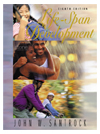 |  Life-Span Development, 8/e John W. Santrock,
University of Texas - Dallas
Middle and Late Childhood Physical and Cognitive Development in Middle and Late Childhood
Chapter ObjectivesI.Explain the physical changes that take place during middle and late childhood, including motor development. |
 |  |  | II.Discuss the importance of exercise and the effects of sports. |
 |  |  | III.Discuss the most prevalent health issues of this time period--accidents and injuries, obesity, and childhood cancer. |
 |  |  | IV.Discuss what a learning disability is and the types of learning disabilities children have. |
 |  |  | V.Consider how the educational system helps children with disabilities. |
 |  |  | VI.Understand Piaget's theory of concrete operations, and examine how his theories are applied to teaching as well as criticisms of his theory. |
 |  |  | VII.Describe how information processing examines cognitive development, including changes in memory, critical thinking, and metacognition. |
 |  |  | VIII.Discuss what intelligence is, how it is measured, and the difficulty in measuring it. |
 |  |  | IX.Explain Sternberg's and Gardner's alternative theories of intelligence. |
 |  |  | X.Examine the controversies surrounding intelligence, including culturally-biased tests and the misuse of intelligence tests. |
 |  |  | XI.Discuss mental retardation and its two causes. |
 |  |  | XII.Explain what giftedness is and the characteristics of a gifted child. |
 |  |  | XIII.Understand what creativity is and ways to foster it in children. |
 |  |  | XIV.Describe the two approaches to reading and the effectiveness of each. |
 |  |  | XV.Discuss bilingual education and the positions of both its critics and its supporters. |
|



 2002 McGraw-Hill Higher Education
2002 McGraw-Hill Higher Education